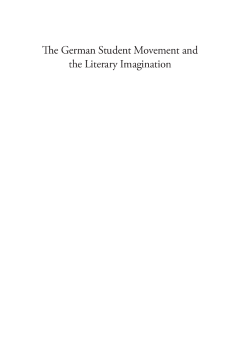
Additional Information
Book Details
Abstract
Through a close reading of novels by Ulrike Kolb, Irmtraud Morgner, Emine Sevgi Özdamar, Bernhard Schlink, Peter Schneider, and Uwe Timm, this book traces the cultural memory of the 1960s student movement in German fiction, revealing layers of remembering and forgetting that go beyond conventional boundaries of time and space. These novels engage this contestation by constructing a palimpsest of memories that reshape readers’ understanding of the 1960s with respect to the end of the Cold War, the legacy of the Third Reich, and the Holocaust. Topographically, these novels refute assertions that East Germans were isolated from the political upheaval that took place in the late 1960s and 1970s. Through their aesthetic appropriations and subversions, these multicultural contributions challenge conventional understandings of German identity and at the same time lay down claims of belonging within a German society that is more openly diverse than ever before.
“Rinner’s book stretches the scope of 1968 with the works she analyzes. She engages also in a thoughtful discussion of secondary literature, recent studies, and she addresses a range of spatial and temporal considerations. Rinner presents her readers with convincing and insightful views on texts that cut across abroad geography and time span, thus providing a fresh look at the memories of 1968.” · German Quarterly
“[an] insightful analysis [that] Rinner provides in a brief, well-ordered text.” · Choice
“Rinner’s study is theoretically sophisticated but also quite lucid, and her unique approach to 1968 cultural memory novels is usually convincing...[it] makes a striking, original contribution to current discourse on 1968 novels, and how they, and the period they represent, can be productively engaged in the contemporary German transnational sphere.” · German Studies Review
"[This book] represents to date the most extensive study of literature's multi-faceted negotiation of the historical moment symbolized by the date 1968 and of the discursive struggle over competing inscriptions of it into collective memory. Rinner engages with the existing scholarship on this issue and develops persuasive readings of exemplary literary texts in support of her claims…Rinner manages to weave various strands of her analysis together into a stimulating palimpsest of provocative insights into literary discourse's significance for the construction of the cultural memory of 1968.” · H-Soz-u-Kult
“Without doubt, Rinner’s study constitutes a noteworthy addition to the publications about the literary responses to an important phase of postwar German history. By casting her net wide both chronologically and geographically, she succeeds in reaffirming the significance of literary contributions to the cultural memory of 1968.” · Monatshefte
“This is a thoughtful study of the current discourse surrounding the important role of literature in shaping cultural memory…The case of the literary representation of the German ‘1968’ is particularly interesting as it reveals a continuing preoccupation with the traumatic effects of Germany’s past.” · Ingo Cornils, University of Leeds
Susanne Rinner is Assistant Professor of German Studies and regular program faculty in the Women’s and Gender Studies Program at the University of North Carolina at Greensboro. Most recently, she edited a special issue of International Poetry Review focused on poetry written in German by bilingual and multicultural poets. She has published several articles on contemporary German literature and is working on a book-length study of intermediality and intertextuality in contemporary German culture.
